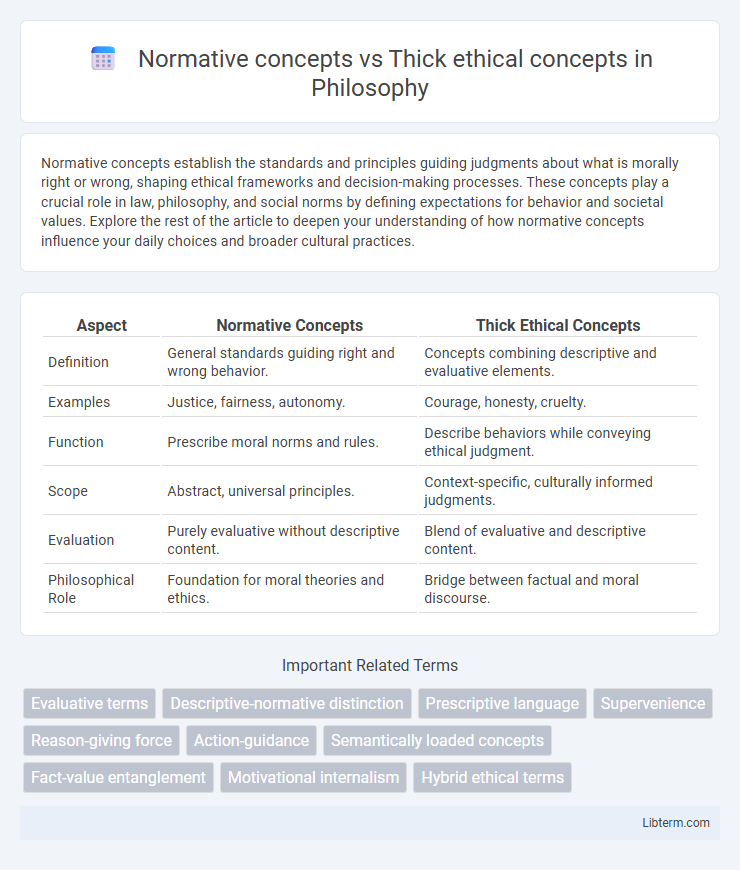Normative concepts establish the standards and principles guiding judgments about what is morally right or wrong, shaping ethical frameworks and decision-making processes. These concepts play a crucial role in law, philosophy, and social norms by defining expectations for behavior and societal values. Explore the rest of the article to deepen your understanding of how normative concepts influence your daily choices and broader cultural practices.
Table of Comparison
| Aspect | Normative Concepts | Thick Ethical Concepts |
|---|---|---|
| Definition | General standards guiding right and wrong behavior. | Concepts combining descriptive and evaluative elements. |
| Examples | Justice, fairness, autonomy. | Courage, honesty, cruelty. |
| Function | Prescribe moral norms and rules. | Describe behaviors while conveying ethical judgment. |
| Scope | Abstract, universal principles. | Context-specific, culturally informed judgments. |
| Evaluation | Purely evaluative without descriptive content. | Blend of evaluative and descriptive content. |
| Philosophical Role | Foundation for moral theories and ethics. | Bridge between factual and moral discourse. |
Understanding Normative Concepts
Normative concepts express evaluative judgments that guide actions according to standards of right and wrong, such as "justice," "duty," and "virtue." They provide frameworks for assessing behavior without necessarily embedding descriptive content about the world. Understanding normative concepts involves analyzing their role in moral reasoning and their function in prescribing actions and principles within ethical systems.
Defining Thick Ethical Concepts
Thick ethical concepts combine descriptive and evaluative aspects, providing specific information about actions or traits while simultaneously expressing moral approval or disapproval. They differ from normative concepts, which are purely evaluative without descriptive content. Defining thick ethical concepts involves understanding terms like "courageous" or "cruel," which convey both factual characteristics and ethical judgments in a unified expression.
Key Differences Between Normative and Thick Ethical Concepts
Normative concepts provide general standards for evaluating actions or character traits, such as "right," "wrong," or "good," focusing on prescriptive judgments without detailed descriptive content. Thick ethical concepts combine evaluative and descriptive elements, such as "courageous" or "cruel," encapsulating both moral assessment and specific behavioral characteristics. The key difference lies in the depth of meaning, with normative concepts offering broad moral guidance while thick ethical concepts convey richer, context-dependent moral understanding.
Historical Development of the Terminology
Normative concepts, which prescribe standards of right and wrong, emerged prominently in philosophical discourse during the 20th century as ethicists sought clearer distinctions in moral reasoning. Thick ethical concepts, combining descriptive and evaluative elements, have roots tracing back to Aristotle's virtue ethics, emphasizing character traits intertwined with moral evaluation. The development of terminology reflects ongoing debates, with contemporary scholars refining these categories to better analyze moral language and its historical context.
Examples of Normative Concepts in Ethics
Normative concepts in ethics, such as justice, obligation, and rights, define standards for evaluating actions by prescribing what ought to be done. Examples include justice, which demands fairness and equality, and duty, emphasizing moral responsibilities individuals must uphold regardless of personal feelings. These concepts differ from thick ethical concepts, like bravery or cruelty, which combine descriptive and evaluative elements by characterizing actions or traits along with moral judgments.
Illustrative Cases of Thick Ethical Concepts
Thick ethical concepts combine descriptive and evaluative elements, offering rich, context-specific meanings that guide moral judgments, such as "cruel," "brave," or "deceitful." Illustrative cases include "cruelty" in animal treatment debates, where the term conveys both factual harm and ethical condemnation, highlighting its dual descriptive-evaluative nature. These concepts contrast with normative concepts, which are primarily evaluative and abstract, like "good" or "right," lacking the intricate descriptive context found in thick ethical terms.
The Role of Evaluation and Description
Normative concepts inherently involve evaluative judgments, guiding actions by expressing approval or disapproval, while thick ethical concepts combine descriptive content with evaluative meaning, offering detailed characterizations alongside moral assessments. The role of evaluation in normative concepts is explicit and central, enabling clear prescriptions or prohibitions, whereas thick ethical concepts integrate evaluation within rich descriptive contexts, making moral judgments inseparable from factual descriptions. This fusion allows thick ethical concepts to function both as tools for moral evaluation and as lenses for understanding complex social or personal behaviors.
Philosophical Debates Surrounding Thick Concepts
Thick ethical concepts such as honesty, courage, or cruelty combine descriptive and evaluative elements, blurring the line between facts and values, which sparks significant philosophical debates about their normative status. Scholars argue whether thick concepts function merely as descriptive terms supplemented by moral evaluation or inherently possess normative force, influencing action and judgment directly. This debate centers on questions of semantic complexity, the role of cultural context, and the possibility of objective moral knowledge embedded within thick ethical vocabulary.
Significance for Moral Reasoning and Discourse
Normative concepts such as justice and rights provide general standards that guide moral reasoning by setting clear evaluative criteria applicable across contexts. Thick ethical concepts like honesty and cruelty combine descriptive and evaluative elements, enriching moral discourse by embedding emotional and cultural nuances in judgments. Their significance lies in balancing abstract principles with contextual sensitivity, enabling more precise and meaningful ethical analysis.
Implications for Ethical Theories and Practice
Normative concepts, such as "right" and "wrong," provide clear evaluative standards that guide ethical theories by defining general moral principles applicable across contexts. Thick ethical concepts like "cruel" or "courageous" combine descriptive and evaluative elements, offering nuanced insights into character and actions that influence practical moral judgments. The interplay between these concepts shapes ethical frameworks by balancing universal norms with context-dependent moral understanding, impacting both theoretical coherence and real-world ethical decision-making.
Normative concepts Infographic

 libterm.com
libterm.com